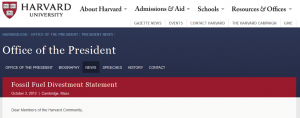Earlier this month, Harvard University issued a statement responding to the campaign initiated by Bill McKibben and 350.org to persuade institutions to divest their fossil fuel holdings. Harvard’s conclusion that it would not consider divestment may not have been a surprise, and was certainly disappointing to many. But the statement is indicative of more progress for sustainable investing, and not just at Harvard.
The statement was issued by the President of the University as a “letter” to the Harvard community and posted as a news item on her page on Harvard’s web site. A communication by the President to a such a wide audience acknowledges that how the institution’s assets are invested is a concern for the leadership of the institution itself and all its stakeholders, not a black box mechanical process carried out by professionals in isolation. For many years, questions raised about an institution’s investments were referred to the investment professionals (in-house or external), in much the same way a question about a choice of, say, product design software would be referred to the I/T organization. Involvement by institutional leadership is an implicit acknowledgement that investment decisions have material impacts that extend beyond the purview of financial professionals and must be considered more broadly.
The President goes a step further by articulating multiple considerations for Harvard’s decision, many of which speak to the university as a whole. Giving multiple reasons for a decision on divestment is by definition a statement that the decision does not rest exclusively on one factor – that of projected investment returns. This too is a change.
The letter raises all the major questions institutions have about sustainable investing, providing opportunity for further discussion and debate:
- The endowment funds serve to advance the institution’s mission, “not to serve other purposes, however worthy”.
- “Significantly constraining investment options risks significantly constraining investment returns.”
- The impact is insignificant – we don’t own that much, and others will buy what we divest.
- Is it hypocritical to refuse to invest in companies that we as individuals patronize and rely on in our daily lives?
- Is engagement a better option than divestment?
Let’s look at each of these in turn:
The endowment funds serve to advance the institution’s mission, “not to serve other purposes, however worthy”.
The endowment funds are invested in enterprises and projects that are the most significant players in the world economy. What they do will have an impact on Harvard’s pursuit of its mission – perhaps positive, perhaps negative. It is impossible to divorce the investments from the real world. Put another way, the investments are assets just as the people and facilities of the institution are. Those assets all affect the institution’s mission. The impact of a given investment may or may not be the determining factor in making that investment, but it should be a consideration.
“Significantly constraining investment options risks significantly constraining investment returns.”
Here’s the full statement:
“Despite some assertions to the contrary, logic and experience indicate that barring investments in a major, integral sector of the global economy would — especially for a large endowment reliant on sophisticated investment techniques, pooled funds, and broad diversification — come at a substantial economic cost.”
This has always been a central challenge of sustainable investing. Although it’s a small concession, the disclaimer “despite some assertions to the contrary” and use of the word “indicate” formally acknowledges that there is a challenge to the previously accepted gospel that any attempt to restrict investments must harm returns.
There are in fact, an increasing number of studies and reports with evidence that it may be possible to remove a sector without harming returns. These are not conclusive, but they are at least suggestive. Every investor is different, so Harvard in fairness may at this point legitimately conclude that this doesn’t apply in their case. But evidence will continue to be gathered, so that conclusion is subject to change in the future.
The impact is insignificant – we don’t own that much, and others will buy what we divest.
This is much less true for Harvard than for other investors. And Harvard is a leader and an example others follow. A herd mentality is also not an unprecedented occurrence. The backlash against coal has been significant, perhaps larger than the economic fundamentals would indicate.
All investors build portfolios that make choices. Some asset managers, such as Trillium, are using quantitative models to build fossil-free portfolios that still have exposure to the energy sector. The larger the portfolio, the greater the opportunity for choice.
Is it hypocritical to refuse to invest in companies that we as individuals patronize and rely on in our daily lives?
This is a fair question, and one every responsible investor should ask. It also carries an economic undercurrent – if we depend on something, the companies that provide it are likely to do well. But that can change. Investors who divested large department stores and invested in Amazon and online commerce before it became ubiquitous likely did very well.
Is engagement a better option than divestment?
This is and has been a central debate in responsible and sustainable investing. The birth of modern sustainable investing around the issue of apartheid in South Africa featured spirited debates on both sides, and that remains true today when the question is fossil fuel divestment. Both options, and variations on them, are likely to be embraced by different investors.
But even after raising each of these legitimate questions and for the most part concluding that the answers argue against divestment, the balance of the statement comes down unequivocally in support of sustainable investing:
- “There are a number of more effective way for Harvard both to address climate change and to enhance our commitment to sustainable investment“.
- “We also have a strong institutional commitment to sustainability in how we live and work.”
- “As a long-term investor, we need to strengthen and further develop our approach to sustainable investment.”
- “we are naturally concerned about environmental, social and governance factors that may affect the performance of our investments now and in the future.”
- Harvard Management Company’s new vice-president for sustainable investing, Jameela Pedicini (hired from Calpers) will help Harvard “think in more nuanced, forward-looking ways about sustainable investment, including the consideration of environmental, social and governance factors.”
So, although the debate over divestment versus engagement will undoubtedly continue, at Harvard and elsewhere, investors and investment managers should see in this statement strong support for sustainable investing by one of the world’s leading long-term investors.
Years of experience working with universities, leave me in no doubt about the enormous difficulty of driving change at such institutions, especially Harvard. A internal champion like Jameela Pedicini is essential, but certainly not sufficient. It is a big job. Those understandably eager for faster change can and should support this effort at Harvard and elsewhere.
For Harvard, a word of caution. Knowing how carefully statements like these are crafted, I have no doubt that words like “logic” and “experience”, were thoughtfully chosen. But I suggest those words should give Harvard – and other institutions – pause when using them to justify a decision about investment choices:
- logic – does anyone still believe that investors are logical and rational decision makers? In a time of ubiquitous connectivity, they certainly don’t make decisions independently. The aggregate of their decisions – the market – is as a result not guaranteed to be normally distributed.
Or, as John Maynard Keynes observed, “Markets can remain irrational a lot longer than you and I can remain solvent.“ - experience – “Past performance is no guarantee of future results.“

